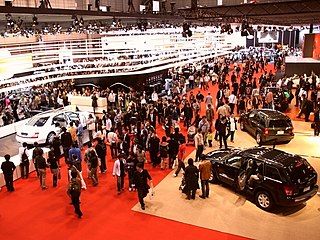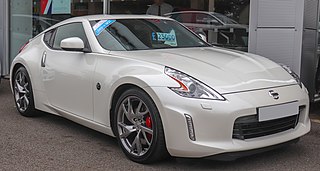
A sports car is a car designed with an emphasis on dynamic performance, such as handling, acceleration, top speed, the thrill of driving, and racing capability. Sports cars originated in Europe in early 1902 and are currently produced by many manufacturers around the world.

A hatchback is a car body configuration with a rear door that swings upward to provide access to the main interior of the car as a cargo area rather than just to a separated trunk. Hatchbacks may feature fold-down second-row seating, where the interior can be reconfigured to prioritize passenger or cargo volume.

The Ford Probe is a liftback coupé produced by Ford, introduced in 1988 and produced until 1997. The Probe was the result of Ford's collaboration with its longtime Japanese partner Mazda, and both generations of Probe were derived from the front-wheel drive Mazda G platform that underpinned the Mazda Capella.

The Renault Mégane, also spelled without the acute accent as Megane, especially in languages other than French, and also known as the Renault Megavan for an LCV in Ireland, as the Renault Scala in Iran and as the Renault Mégane Grandcoupé for the saloon in Israel, Palestinian Authority and Serbia for certain generations, is a small family car produced by the French car manufacturer Renault for the 1996 model year, and was the successor to the Renault 19. The Mégane has been offered in three- and five-door hatchback, saloon, coupé, convertible and estate bodystyles at various points in its lifetime, and having been through four generations is now in its fifth incarnation.

The Nissan 350Z is a two-door, two-seater sports car that was manufactured by Nissan Motor Corporation from 2002 until 2009 and marks the fifth generation of Nissan's Z-car line. The 350Z entered production in 2002 and was sold and marketed as a 2003 model from August 2002. The first year there was only a coupe, as the roadster did not debut until the following year. Initially, the coupe came in Base, Enthusiast, Performance, Touring and Track versions, while the Roadster was limited to Enthusiast and Touring trim levels. The Track trim came with lightweight wheels and Brembo brakes, but its suspension tuning was the same as all other coupes. The Nissan 350Z was succeeded by the 370Z for the 2009 model year.

The Nissan Skyline is a brand of automobile originally produced by the Prince Motor Company starting in 1957, and then by Nissan after the two companies merged in 1967. After the merger, the Skyline and its larger counterpart, the Nissan Gloria, were sold in Japan at dealership sales channels called Nissan Prince Shop.

The Nissan Sunny is an automobile built by the Japanese automaker Nissan from 1966 to 2004. In the early 1980s, the brand changed from Datsun to Nissan in line with other models by the company. Although production of the Sunny in Japan ended in 2004, the name remains in use in China and GCC countries for a rebadged version of the Nissan Almera.

The Nissan Sentra is a series of automobiles manufactured by the Japanese automaker Nissan since 1982. Since 1999, the Sentra has been categorized as a compact car, while previously it occupied the subcompact class. Until 2006, Sentra was a rebadged export version of the Japanese Nissan Sunny, but since the 2013 model year, Sentra is a rebadged export version of the Sylphy. The Sentra nameplate is not used in Japan. Many other countries in Latin America sell their versions of the Sunny as the Sentra. In Mexico, the first three generations of the Sentra were known as the Nissan Tsuru, and the B13 model was sold under that name until 2017, alongside the updated models badged as Sentra.

The Infiniti G Line is a series of compact executive cars manufactured and marketed by Infiniti, a luxury division of Nissan, for the 1991–1996 and 1999–2016 model years — across four generations.

The Japan Mobility Show (ジャパンモビリティショー) (TMS) is a biennial auto show held in October–November at the Tokyo Big Sight, Tokyo, Japan for cars, motorcycles and commercial vehicles. Hosted by the Japan Automobile Manufacturers Association (JAMA), it is a recognized international show by the Organisation Internationale des Constructeurs d'Automobiles, and normally sees more concept cars than actual production car introductions which is the reason why the auto press see the show as one of the motorshow's big five.

The Lexus LF line is a series of concept cars built by Lexus, the luxury vehicle division of Toyota Motor Corporation. The "LF" designation refers to Lexus Future. The LF Series vehicles features coupes/convertibles, including: the LF-A, the LF-A Roadster, LF-LC, LF-CC, and the LF-C; sedans: the LF-S, LF-Sh, and LF-Gh; crossover SUVs: the LF-X and LF-Xh; and hatchbacks: the LF-Ch. The first concept vehicle of the LF Series, the LF-X, appeared in 2003. The LF Series utilizes L-finesse, a design philosophy named for "Leading Edge" and "finesse", which debuted on the LF Series concepts and later extended to all new production Lexus vehicles. New vehicle technologies on the LF Series include advanced instrumentation, multiple driver-selected vehicle configurations, hybrid and experimental powertrains, and unconventional driver interface designs. The vehicles also feature new design cues which derive from the L-finesse design language of "Intriguing Elegance" (純), "Incisive Simplicity" (妙), and "Seamless Anticipation" (予). Several of the LF concept vehicles have appeared close to their production counterparts, while the design cues of other LF concepts appeared on more distinctly different production vehicles.
The Vision Gran Turismo program is a series of concept cars for the Gran Turismo video game series, developed by a cross-section of the world's top automobile manufacturers. These cars appeared originally in the video game Gran Turismo 6, and later made an appearance in each subsequent Gran Turismo installment, all developed by Polyphony Digital. For the most part, they apply present-day technology and materials, with a handful of notable exceptions that utilize novel propulsion and aerodynamic technologies. Their appearance as free update content has been staggered since the launch of GT6 in 2013, with each one being available for download upon release.

The Nissan GT-R is a car built by Japanese marque Nissan since 2007. It has a 2+2 seating layout and is considered both a sports car and a grand tourer. The engine is front-mid mounted and drives all four wheels. It succeeds the Nissan Skyline GT-R, a faster variant of the Nissan Skyline. Although this model was the sixth-generation to bear the GT-R name, it is no longer part of the Skyline line-up. The car is built on the PM platform, derived from the FM platform used in the Skyline and Nissan Z models. Production is conducted in a shared production line at Nissan's Tochigi plant in Japan.

The Nissan 370Z is a 2-door, 2-seater sports car manufactured by Nissan Motor Company. It was announced on October 29, 2006, and was first shown at an event in Los Angeles ahead of the 2008 Greater LA Auto Show, before being officially unveiled at the show itself. The 370Z is the sixth generation of the Nissan Z-car line, succeeding the 350Z. The 370Z marks the last production car with a naturally aspirated and high-rev V6 coupled to a manual transmission. The 2020 model year was the final model year for the 370Z. The line was continued by the Nissan Z (RZ34) on a modified version of the same platform.
Toyota concept vehicles are transportation devices manufactured or designed by automobile company Toyota from 2000 to 2009. As their name suggests, these vehicles were concepts, and, as such, many were never released to dealerships. Many were developed in conjunction with other corporations such as Sony or Subaru.
The MID4 was an experimental sports car produced by Nissan.

The Nissan Silvia is the series of small sports cars produced by Nissan. Versions of the Silvia have been marketed as the 200SX or 240SX for export, with some export versions being sold under the Datsun brand.
A retro-style automobile is a vehicle that is styled to appear like cars from previous decades. Often these cars use modern technology and production techniques. This design trend developed in the early 1990s and led to almost all automobile brands introducing models that referenced previous cars of the 1950s and 1960s.

The Chevrolet Code 130R is a compact 2-door sports coupe concept revealed by American automobile manufacturer Chevrolet at the 2012 North American International Auto Show inspired by the Chevrolet Nova.

The Nissan Z, known in Japan as the Nissan Fairlady Z, is the seventh generation of the Z-car line of sports cars manufactured by Nissan. The model succeeded the 370Z, though is built on a modified and revised version of the previous generation's platform. The model also drops the numerical nomenclature of the previous generations.


















